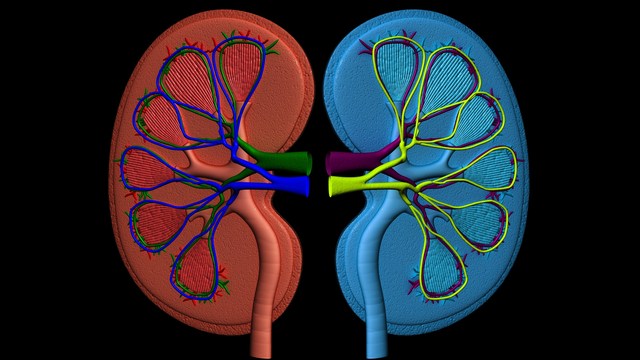The kidneys are vulnerable to a number of types of cancers. The most common type of adult kidney cancer is renal cell carcinoma, which targets the lining of the proximal convoluted tubules (tubes that filter blood and remove waste). It is also known as renal adenocarcinoma or hypernephroma.
Transitional cell carcinoma hits the kidney's renal pelvis (where urine collects in the kidney).
Sarcoma is a rare cancer which grows but does not metastasize (spread throughout the body) like other kidney cancers.
Wilms' tumor is the cancer most common to children. It responds well to treatment.
Once cancer spreads from the kidneys, the game can change rapidly. Cancer can spread from one kidney to the other. Bones, liver, lungs and lymph nodes are at risk.
Cancer cells that spread from the kidneys are still kidney cancer cells, whatever the location. If cells spread to the liver, for instance, they are considered to be kidney cancer, and treatment is the type used for kidney cancer.
A number of treatments are available.
Surgical removal of a kidney is a nephrectomy. A radical nephrectomy takes out the kidney, adrenal gland, and tissue surrounding the kidney, and possibly some lymph nodes.
A simple nephrectomy just removes the kidney.
A partial nephrectomy cuts out just enough of the kidney to get rid of the tumor, usually when the patient has one kidney or both kidneys are cancerous.
In arterial embolization, a catheter (tube) enters the renal artery (main blood vessel) via a blood vessel. An injection into the artery blocks blood flow to the kidney, depriving the tumor of oxygen and hopefully making it shrink. When surgery is not an option, embolization can help reduce symptoms.
Radiation therapy kills cancer cells with high-energy rays affecting only the area of the cancer. Treatment is usually five days a week.
Biological therapy introduces large amounts of interferon alpha or interleukin-2, proteins the body already manufactures to deal with infection and disease, into the bloodstream.
Chemotherapy involves the use of anti-cancer drugs. This treatment is not often used for kidney cancer, as its success is limited.
Kidney (renal) cancer may cause weight loss, fever and fatigue. The individual may experience blood in the urine, chronic pain in the side, or a lump in the side or in the abdomen.
Please be aware that these symptoms do not necessarily indicate cancer. Still, they are a good reason to see a doctor.
Resources:
National Cancer Institute: Kidney Cancer
http://www.cancer.gov/cancertopics/types/kidney
MedicineNet.com: Kidney Cancer
http://www.medicinenet.com/kidney_cancer/article.htm
Renal cell carcinoma
http://www.nlm.nih.gov/medlineplus/ency/article/000516.htm
Occupational Sunlight Exposure Reduces Kidney Cancer Risk in Men, Study Suggests
http://www.sciencedaily.com/releases/2010/03/100308081742.htm
Visit Jody's website and blog at http://www.ncubator.ca and http://ncubator.ca/blogger
Cancer.Net: Kidney Cancer
http://www.cancer.net/patient/Cancer+Types/Kidney+Cancer





Add a CommentComments
There are no comments yet. Be the first one and get the conversation started!